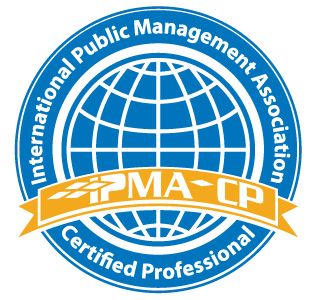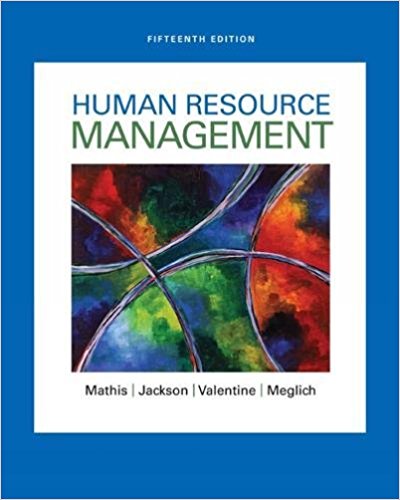
2024 PSHRA Public Sector HR Essentials Program - Session 16
- Registration Closed
Welcome to the PSHRA Public Sector HR Essentials Program!
The course is designed to meet the unique needs of the public sector HR professional.
 Do you want to become an IPMA-HR Certified Professional (IPMA-CP)?
Do you want to become an IPMA-HR Certified Professional (IPMA-CP)?
Look no further as you have come to the right place!
This is a public sector focused credential for qualified HR professionals in an entry-or mid-level career position.
As a foundational course, the Public Sector HR Essentials Program covers all the major areas of a public sector human resources operation outlined in the following eight modules:
- Public Sector HR Basics
- Recruitment
- Selection
- Classification/Compensation
- Benefits
- Labor and Employee Relations
- Equal Employment Opportunity & Diversity
- Organizational Development
Engage with your Classmates:
You are required to comment on at least two of your classmates post for each assignment and attend at least 3 of the 4 Q&A sessions (via Zoom). The Q&A schedule will be sent to you separately via e-mail.
Please click on the "Course Materials" tab above to download the following materials:
- Course E-book
Provided in a flexible online format, you can expect to complete each module at your pace over a period of 2 weeks (unless marked accelerated). You will benefit from the expertise of top public sector HR professionals who understand the unique issues, challenges and opportunities of human resources in the government environment.
Upon completing all 8 modules, you will receive a certificate of completion and are one step closer to IPMA-CP certification.
IPMA-CP Certification: Upon conclusion of Module 8, after completing all the exercises and attempting the practice exams, you will automatically receive a certificate of completion. This does NOT confirm IPMA-CP certification. At the beginning of the course, an exam declaration was provided to state whether you wish to take the IPMA-CP certification exam. You will be asked to give acknowledgement at the beginning of the exam, which states the exam is closed book and copyrighted.
Certification Exam: The IPMA-CP exam can be accessed as part of your course package under "IPMA-CP Exam". You must activate your exam with the green "Activate" button as of the last day of the course. Once activated, your 45 day window to study and take the exam will begin. Should you let the 45-day period lapse, there will be an additional $100 fee to test (subject to change). You will login to https://learning.ipma-hr.org to view your exam as you did with your course.

Joe Gilkerson
Human Resources Director
Prince William County
Joe is currently the Human Resources Director for Prince William County, Joe has held Human Resources positions at the department head level in private sector, in local and federal government, and higher education. Prior to his civilian career, Joe was in the Marine Corps serving as an Infantry Unit Leader with a tour as a Drill Instructor /Senior Drill Instructor at Parris Island, SC.
Joe has completed a Bachelor of Science degree in Business Management, a Master of Science degree in Organizational Leadership, the Senior Executive Institute (SEI) from the University of Virginia, a Graduate Certificate Program in Local Government Management (from Virginia Tech) and has earned Senior Certified Professional (PSHRA-SCP) designation from the Public Sector Human Resources Association, the Senior Professional in Human Resources (SPHR) certification from the Society of Human Resources Management (SHRM). Joe is the past Virginia chapter president for IPMA-VA (2010-2011).
Joe and his wife, Amy reside in Fredericksburg with their son Bruce is a Senior attending the Virginia Military Institute (VMI) pursuing a Civil Engineering degree .
Accelerated Course Schedule and Syllabus:
(please read this ENTIRE page for important course information and dates)
This course was designed specifically for new Human Resource professionals, or those seeking knowledge of other HR disciplines outside of their normal work assignments. The course will cover all of the major areas within a full-functioning Human Resources operation. The information presented is intended to provide a working understanding of each of the following disciplines:
- Public Sector HR Basics
- Recruitment
- Selection
- Job Classification and Compensation
- Employee Benefits
- Labor and Employee Relations
- EEO and Diversity
- Organizational Development
The course is divided into the eight subject areas, or Modules, listed above. Where appropriate, we have included cross references to material or information contained in other Modules. This reflects the inter-relatedness of each of the functional disciplines within the HR umbrella.
Materials used as part of this course include:

Human Resource Management, Fifteenth Edition (14th Edition will also work)
Robert L. Mathis and John H. Jackson (must be purchased separately)
At the beginning of each module, we have listed the reading assignment from the Mathis and Johnson textbook, which is the main text for this course.
This online course provides a number of benefits to participants:
- Flexibility in completing class assignments on YOUR schedule, with the freedom of location and time of day;
- Opportunity to interact with other HR professionals from around the country;
- Addresses the needs of all types of learners, and those reluctant to speak in groups are drawn more readily into the discussions.
Engage with your Classmates:
You are required to comment on at least two of your classmates post for each assignment and attend at least 3 of the 4 Course Check-in meetings (via Zoom). The Q&A schedule will be sent to you separately via e-mail.
 Module 1: Public Sector HR Basics
Module 1: Public Sector HR Basics
(Suggested Study Time: 2 weeks)
This module provides an overview of the HR function in public organizations, and includes:
- Understanding the differences between public and private sector HR operations;
- History of laws that have affected the development of the public sector HR function;
- Review of the major laws and regulations that govern HR operations;
- Roles and responsibilities of HR professionals in organizations;
- Discussion of typical organizational structures;
- Use of Information Technology to enhance HR operations;
- Strategic HR operations;
- Professional HR Organizations;
- Importance of Ethics in HR.
 Module 2: Recruitment
Module 2: Recruitment
(Suggested Study Time: 2 weeks)
- Role of workforce planning;
- Planning and utilizing recruitment strategies;
- Executive recruitment strategies;
- Long term recruitment strategies;
- Importance of background and reference checks;
- Negotiating with selected candidates;
- Importance of evaluating recruitment strategies.
 Module 3: Selection
Module 3: Selection
(Suggested Study Time: 1 weeks)
- Selection in the public sector;
- Merit system considerations;
- Typical selection methods;
- Test development and design;
- Test administration considerations;
- Scoring methodologies;
- Use of preference points;
- Use and management of eligible lists;
- Other qualification considerations.
 Module 4: Job Classification and Compensation
Module 4: Job Classification and Compensation
(Suggested Study Time: 2 weeks)
- Applicable laws and regulations that govern job classification activities;
- Concepts and principles of job classification;
- Job analysis techniques;
- Classification processes;
- Methods for establishing classification relationships;
- Importance of classification strategies to other HR disciplines.
- Translating classification into compensation;
- Pay for performance;
- Executive compensation;
- Importance of compensation strategies to other HR functions.
 Module 5– Employee Benefits:
Module 5– Employee Benefits:
(Suggested Study Time: 1 weeks)
- Benefits terminology;
- Types, characteristics, and funding of benefits;
- Selection and negotiation with providers;
- Budget and cost control;
- Applicable laws that govern benefit plans;
- Retirement Plans;
- Importance of benefits strategies to other HR functions.
 Module 6– Labor and Employee Relations:
Module 6– Labor and Employee Relations:
(Suggested Study Time: 2 weeks)
- Applicable laws and regulations that govern labor/employee relations activities;
- Bargaining units;
- Collective bargaining models;
- Forms of collective bargaining agreements;
- Work interruptions/stoppages;
- Laws and regulations that affect collective bargaining processes;
- Discipline procedures;
- Grievance administration and arbitration;
- Labor/management relations.
 Module 7 – EEO and Diversity:
Module 7 – EEO and Diversity:
(Suggested Study Time: 2 weeks)
- Laws that govern EEO and Diversity strategies;
- Regulatory/oversight agencies;
- EEO concepts and employer’s policies;
- EEO Uniform Guidelines and selection policies;
- Discrimination complaints, investigations, and resolution;
- Reasonable accommodations;
- EEO reports and monitoring;
- Importance of diversity programs to other HR functions.
 Module 8 – Organizational Development:
Module 8 – Organizational Development:
(Suggested Study Time: 10 days)
- Organizational culture and change strategies;
- Employee development;
- Performance management;
- Progressive discipline and counseling and coaching;
- Application of organizational development strategies to succession planning.
Expected Course Completion Date: January 14, 2024.
Please note: Your IPMA-CP exam must be activated prior to January 15, 2025.
Course Check Dates (Subject to Change):
- Course check in 1: 10/18/2024 - 3:00 PM - 4:00 PM ET
- Course check in 2: 11/22/2024 - 3:00 PM - 4:00 PM ET
- Course check in 3: 12/13/2024 - 3:00 PM - 4:00 PM ET
- Course check in 4: 1/10/2025 - 3:00 PM - 4:00 PM ET
IPMA-CP Certification Exam:
Upon completion of the course, you will be able to download your certificate of completion after finishing Module 8. The certificate of completion is not your official certification credential. Passing the IPMA-CP certification examination is required to become IPMA-CP certified.
The IPMA-CP certification exam is included as part of the course package-2nd item. The exam is administered online in this platform. When you are finished with the course (required) and ready to take the exam, there is a green "Activate" button to click on. Only click on the green "Activate Button" when you are ready to activate the 45-day window.